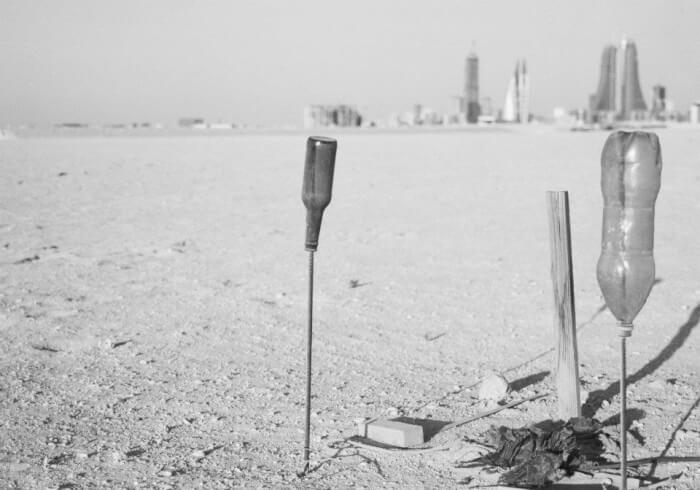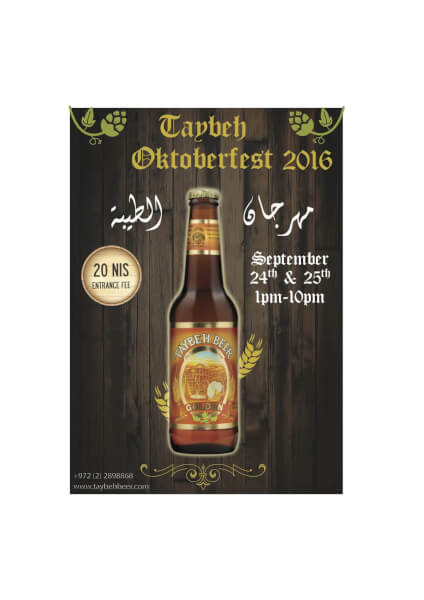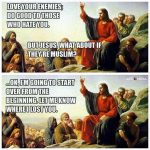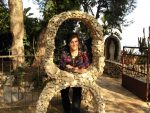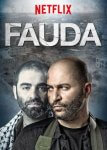The Voice of Salah e-Eddine Haunts Kobani
By Abdennour Toumi
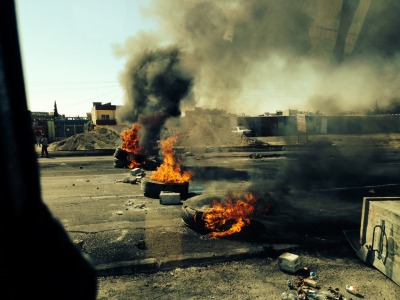
(Suruç, Turkey) After more than two weeks’ resistance, ISO militants have taken over neighboring villages southwest of Kobani (Aïn-el-Arab) forcing an exodus of northern Syria’s ethnic Kurdish population across the border to the southern city of Suruç in Şanliurfa province. As a result the Turkish military has sent troops and tanks to the border in response and is urging the creation of a buffer zone.
Syrian Kurdish militias, known as the People’s Protection Units or YPG, have been resisting the ISO using automatic rifles and heavy machine guns. They are still fortifying their positions with sand bags and operating as urban guerrillas in and around the city.
On Monday evening the villages near Kobani fell to the ISO. Indeed, Turkey’s ethnic Kurdish cities have been burning from Batman all the way to Şanliurfa, though Kobani is in the hands of ISO. So this week is a “civil disobedience” throughout the Kurdish cities and the southeast in general.
When the news broke via a local Kurdish channel, the entire city’s public lighting system, even the Internet, went down. From their balconies people launched mournful chants, voicing solidarity. A huge placard was displayed on the wall of Kiziltepe City Hall, Mardin, there was light signaling and the beating of drums could be heard.
In Suruç, hundreds of young men gathered in a public square vowing to go to Kobani to fight. Still later heavy gunfire was heard throughout the city. This year the situation in Kobani overshadows the celebration of Eid-el-Adha (Byram), a four-day holiday in Turkey.
Unfortunately this holiday in Kiziltepe and Suruç was not as festive as it should be. I spoke with locals and was told it is usually very joyful, but this year marks a very despairing time for the Kurdish people in the region, although solidarity is highly apparent in the population.
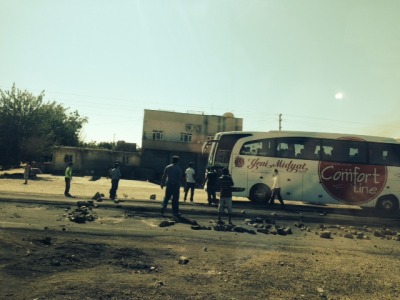
I was present during the Eid prayer when the Imam spoke for several minutes in his Khotba about Kobani.
After the siege and fall of Kobani’s neighboring towns, UNHCR and local NGOs estimate more than 160,000 Kurds and Arabs fled the devastated area crossing into Suruç in Sanliurfa.
According to eye witnesses on the ground the fighting continues and the combat is intense, despite reports from the media. Syrian Kurds, in touch with their relatives in Kobani, report that ISO fighters have seized villages from the hands of YPG fighters, the main armed Kurdish group in northern Syria.
I was told also that local young men and women are organizing themselves into armed self-defense groups, patriotically defending neighboring areas of Kobani (they remind me of similar actions in Algerian towns in 1994-1999).
A Kurdish teacher and musician, known by his nom d’artiste, Hozan, married with three children, also fled the military zone. He told me the situation there is by all accounts desperate, towns are ghost towns, and only young Kurds, mostly the educated, have stayed to fight “to the last drop of blood,” as he put it.
He mentioned there are Kurdish fighters coming from other regions in Turkey and Kurdistan Iraq. For them Kobani is vital and a matter of survival for Kurds, not only in Syria but in Iraq and Turkey as well.
Hozan’s friend added there are Syrian Arabs fighting with the Kurds, organized groups such as Kat’yeb Shams e-Echamal (The Northern Sun Battalions), Kat’yeb Oussoud e-Essafiara (e-Essafiara’s Lions Battalions), fighting side by side with Lewa J’behat el-Akrad (Kurdish Alliance Brigade), and Lewa Ahr’ra Jarablos (Free Jarablos Brigade); all these groups are coordinating with the Free Syrian Army (FSA).
When asked where they get their weapons, he replied that people have always had weapons in their possession for self-defense, but today they are using them to defend against the ISO. Later a middle-aged woman, in an expression of Kurdish pride and resilience, remarked, “If the Turkish government would let our men from here (Suruç area) cross the border, we could defense ourselves with honor and crush those animals.”
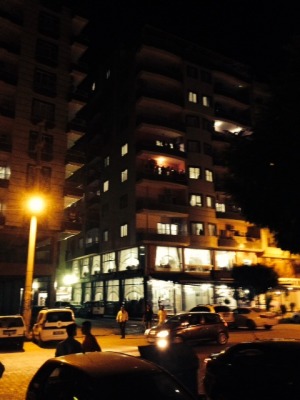
I listened to the emotional accounts of refugees and volunteers alike who shared their experiences, Hogir telling how he had fled with his family, Hara reporting that the International Coalition had been bombing ISO targets for hours with no results.
A beautiful young woman wearing a flowery headscarf and, from the look in her dark eyes, wanting to speak, said, “Listen, we are paying the price of our father (nadfa’a thaman Abouna (in Arabic).”
I stared at her asking, “What do you mean?” Then a young man, apparently well educated, explained in eloquent Arabic, “The Crusaders will never forget what Salah e-Eddine did to them.” I said, “Wait a minute, you mean the Hattin’s battle of 1187 is still haunting them?” He just smiled and the six young men and women together said, “Yes.”
I found this reference to an historical event very interesting, so I asked for more. In the evening I went to dinner with five Kurdish friends (Turk and Syrian) and shared with them what these young people had told me. Aziz said, “Look, it is crazy what is going on. We are considered as ‘non-Muslims and infidels’ by these animals, treated as such by the tyrannical Arab regimes and the descendants of Salah e-Eddine by the West.” (The Syrian Kurds refer to ISO as “animals” – woohoosh in Arabic). I finished my tea, folded my notebook, and said calmly, “what if Salah e-Eddine were listening, would he have gone to Palestine or stayed here to free his people?”
Baram spoke further saying there are around 1,000 Syrian and Iraqi Kurds set up in a security zone to protect the borders, eventually helping women and the elderly to cross, sometimes with the help of the Turkish army.
According to AFAD and locally-elected mokhtars, there are approximately 160,000 Syrian refugees, the majority of whom are women whose husbands have stayed in the war zone to fight.
I also see many children suffering in very poor hygienic conditions. During the holiday of Eid/Byram, refugees received help from local Turkish-Kurdish families who have been very hospitable to their “brothers” (kakinma) as they call them. Aid is also provided by the local authorities working closely with the local NGOs as the city of Suruç is being run by HDP (PDP has recently become HDP).
It is said that some Syrian refugees were badly treated by the Turkish military at the Morshad Pinar gate around 12 kms from Suruç.
Kobani is a strategic point for the Kurds on both sides, so the question for Ankara is how long can it hold the ISO card in its hand, destabilize its Kurds and confuse its NATO allies. Last week Mr. Öcalan’s statement was clear and Ankara seemed to heed it well. Hours later Turkish officials met with Kurdish leader Mr. Salah Muslim Mohammed of the PYD and Mr. Selahttin Dimirtaş, the President of HDP, a Kurdish-Turkish politician and a rising star in Turkish affairs.
Kurdish people are suspicious regarding Ankara’s position on Kobani and the autonomous Kurdish region in northern Syria. This area is of concern for Ankara who, at the meeting with the Presidents of YDP and HDP, posed some conditions before agreeing to become involved direction in the dispute. Specifically, Ankara told the YDP not to declare the north and northeast of Syria (Rojava area – Kobani, Afrin and Qamishlo) as a de facto autonomous region like the north of Iraq.
So, does Ankara intend to declare itself and stake a firm foothold in the region? Because the situation in Kobani and the southern region could change from a zero-problem strategy to a multi-problem one with no strategy.


- The Israeli-Palestinian Conflict: Is the Neither-Peace-nor-Security As-sumption Dominating Again? - June 7, 2021
- Algeria: “I Can See Clearly Now” - August 5, 2019
- Majesty Mohammed VI and General Gaïd Salah Tear Down This Wall! - July 29, 2019















